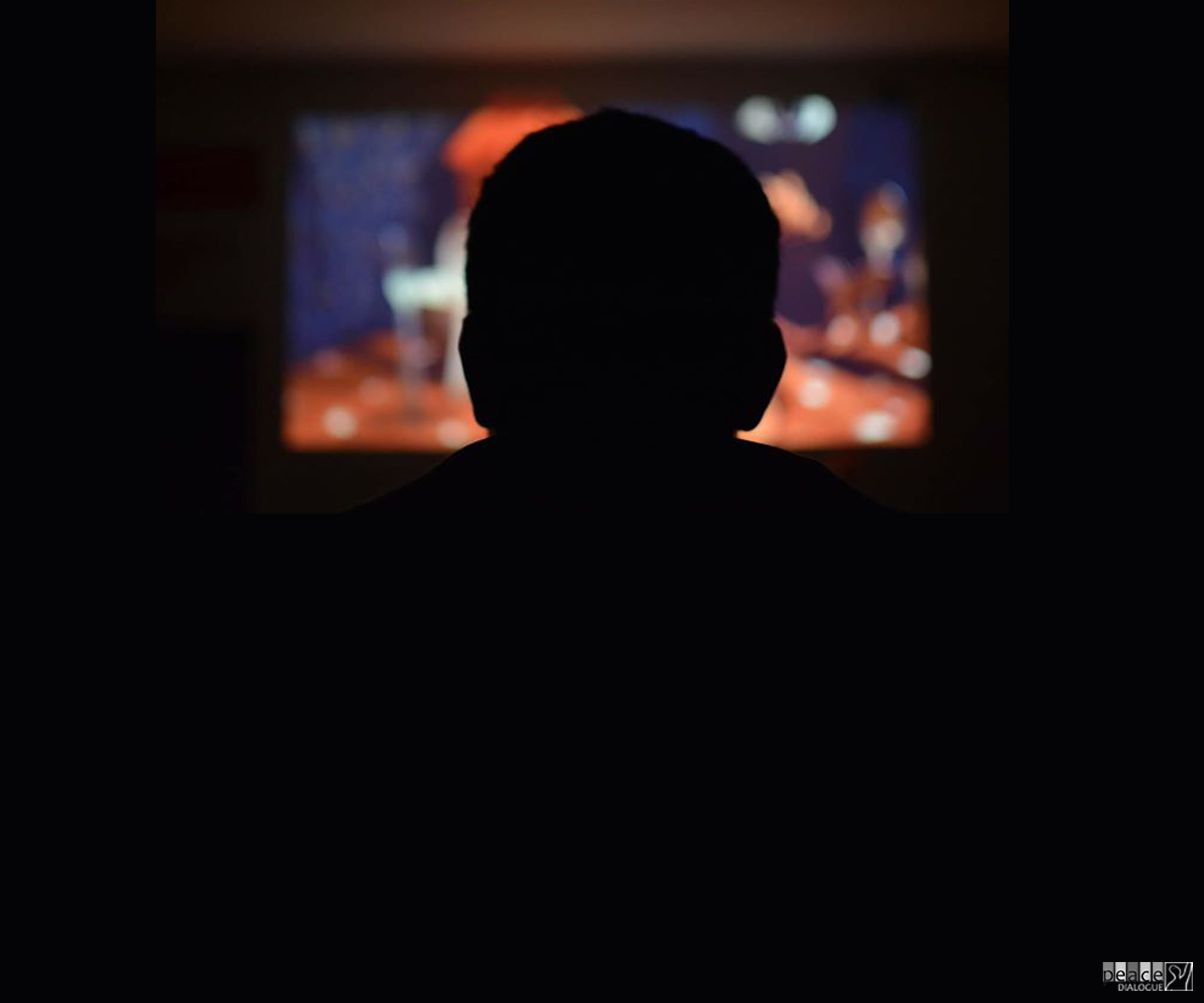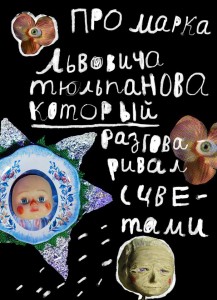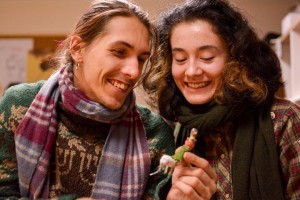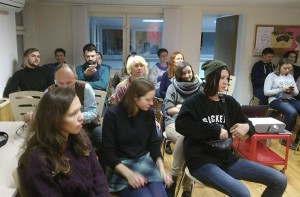
December 22, 2017 at the Kyiv office of the Rosa Luxemburg foundation, was the first public screening of an animated film by Dana Kavelina “The Story of Mark Tulip Who Talked to Flowers”.

 “The story of Mark Tulip was born during my participation in the project “Arena: Community Theatre and Public Art”. In one of the workshops we were asked to prepare, and present creative ideas based on peace initiatives in our respective communities. I spoke with all the Ukrainian participants of the Arena who worked for many years with refugees and the Internally Displaced Persons. They told me several stories, for example about a refugee man who missed his garden terribly after the relocation; or about two brothers fighting for the opposing sides in the Ukrainian conflict. From all those stories the story of Mark Tulip was born. I have picked up those elements from each story I heard, that illustrated the Ukrainian tragedy more vividly,” – said Dana Kavelina.
“The story of Mark Tulip was born during my participation in the project “Arena: Community Theatre and Public Art”. In one of the workshops we were asked to prepare, and present creative ideas based on peace initiatives in our respective communities. I spoke with all the Ukrainian participants of the Arena who worked for many years with refugees and the Internally Displaced Persons. They told me several stories, for example about a refugee man who missed his garden terribly after the relocation; or about two brothers fighting for the opposing sides in the Ukrainian conflict. From all those stories the story of Mark Tulip was born. I have picked up those elements from each story I heard, that illustrated the Ukrainian tragedy more vividly,” – said Dana Kavelina.
Dana started to work on the film at the beginning of 2017 but unfortunately her computer was stolen, and almost all the work was lost. The NGO Peace Dialogue in Armenia offered the filmmaker an opportunity and the needed support to complete the film. Peace Dialogue and its German partner OWEN are the founders and the organizers of the ARENA project.
Even before the film was finished, many people followed its progress via social media and eagerly awaited its completion.

“The screening in Kyiv was attended by many people, many of whom followed the production on the internet,” – said the author. – “Among them were two other participants of the Arena project: Bohdan Dedushkin (who organized the screening) and Oksana Potapova. Oksana Dutchak and Nina Potarskaya the two well-known Ukrainian researchers that work with the issue of IDPs and the Ukrainian conflict in general were also present. Among the attendees were also Director General of TV station Ukrlife, a political analyst Anton Pechenkin and reporters from Vector.media agency. The audience was of various ages (20 to 60) and of diverse political views.”
After the screening there was a discussion mediated by Bohdan Dedushkin.
“It was not easy to discuss the film right after the screening,” – commented many, – “it had such a strong emotional impact.” Many were crying. And after the final credits there was a few minutes of silence.
Nina Potarskaya said that the film is “one of the most sensible statements on the Ukrainian conflict that she knows, because the author is not choosing sides but simply tells a human story.”

Oksana Potapova, also an ARENA participant, told that the film touched a special spot in her heart because her grandmother, the same age as Mark Tulip, is in the conflict zone presently and goes through the same emotional journey as the film’s protagonist.
Some thought that the story, besides the conflict, also deals with the issue of the “invisibility” of elder people in our society and in media. That there are many “Mark Tulips” and something must be done for them.
There also were some who expressed a disappointment in Mark Tulip because he did not make a stand at the end. One person even asked why the hero chose to live when he could choose to die? That sparked a long and passionate debate.
Those who new the first version of the story, wanted to know why Dana changed the end. Many wanted to know the story behind the film. Those two questions led to a larger discussion about peacebuilding in general and about the international conflicts that are raging outside Ukraine today.
“I was asked about Armenia and why the film was shot there. How is the Nagorno-Karabakh conflict similar to the one in Ukraine and what influence it had on the film? Whose idea was to make the film and why the leaders of the ARENA project decided to support it?” – Said the author.
“I told about ARENA, about its members, about Peace Dialogue and OWEN. People even asked how they can join ARENA.” The after-film discussion was very lively and lasted more than two hours and stopped only because the office was closing.
Dana said that she was moved the most by a remark about how Mark Tulip’s story reflects her own personal story.
“When I lost the footage that I shot, my film, I felt it was like Mark Tulip losing his garden. And only after I found the way to reshoot the film, I found the end to Mark Tulip’s story where he plants his garden again. In a way making the film is planting my own personal garden in a new place. The same as the hero in my story did.” – said Dana and added that the screening made her feel like it was a birthday party for her. Or rather for Mark Tulip who is very close to her. She felt acutely how much people waited for the film and how strongly they were rooting for her.
Project’s German Partner – OWEN – Mobile Akademie für Geschlechterdemokratie und Friedensförderung e.V.
The project “Arena: Community Theater and Public Art” is supported by the zivik (Civil Conflict Resolution) programme of the Institute for Foreign Cultural Relations (ifa) with means from the German Federal Foreign Office.





